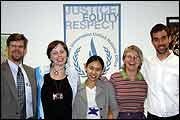New director of UU United Nations Office
Jim Nelson brings international experience to advocacy and educational organization.
Nelson, who took over the UU-UNO in July, says one of his goals is to build UU-UNO’s capacity. He also wants to engage UUs with the UN’s Millennium Declaration, which includes among its goals: eradicating extreme poverty and hunger, promoting gender equality, reducing child mortality, and ensuring environmental sustainability.
Nelson sees networking as one of his office’s primary activities. “Staff, interns, board members, and volunteers help connect UU voices with others in the broad UN-civil society networks,” he says. Communication is key: The office publishes a quarterly newsletter, Window on the World, and maintains a website (www.uu-uno.org). The office also gives workshops at the Unitarian Universalist Association's General Assembly and helps congregations with special UN displays. One of the greatest things, Nelson says, is when someone comes in and says, “I didn’t realize we had an office at the UN” and starts a relationship between their congregation and UU-UNO.
UU-UNO began unofficially around the time of the UN’s formation in 1946 with Elvira Fradkin serving as the American Unitarian Association’s first representative (an unpaid position). In 1956, UU-UNO held the first of its annual intergenerational seminars, a series that continues today. In 1962, the envoy system was created in which volunteers serve as liaisons between their congregations and UU-UNO. At the moment, about half of all UU congregations have an envoy or envoy committee. In 1989, UU-UNO received consultative status with the United Nations, meaning that UU-UNO is recognized by the UN as a nongovernmental organization.
UU-UNO follows developments at the UN relating to human rights and UU special interests as articulated in resolutions passed at the Association's annual General Assembly. The office advocates on these issues by collaborating with official UN nongovernmental organizations such as the Committee for Disarmament, Peace, and Security, and the Committee on Spirituality, Values, and Global Concerns. UU-UNO is also a working member of the Save Darfur Coalition, the Center for UN Reform Education, and the Committee on Freedom of Religion or Belief.
UU-UNO’s other important role is educational: acquainting UUs and congregations with what’s happening at the UN and ways that they can participate. Some of the special projects for UUs include “Every Child Is Our Child,” a program that funds education for 40 AIDS orphans in Ghana, and “Darfur: Take a Stand Against Genocide,” a program consisting of actions that can be taken by individuals and congregations in response to the Darfur human rights tragedy. The office also sponsors UN Sunday, an annual event that has been held for over 20 years, in which congregations devote all or part of a worship service to UN-related issues. In addition, the office sponsors annual internships in its major areas of concern; four interns have been working in the office this fall.
Nelson, a UU for seven years, brings a unique skill set to the job with a BA in political science, which included participating in a summer program on global issues and world churches in Geneva, Switzerland, and an MA in international development. As part of his graduate work, Nelson focused on the collaboration of civil society and the UN in banning land mines. Before coming to his current position, he served as a consultant to the United Nations Association USA in the New Jersey division. Before that he worked with returning Peace Corps volunteers at the Adlai Stevenson Center at Illinois State University. Not all of his international experience has been administrative, however. Nelson also taught high school in Namibia from 1992 to 1995.
The UUA has always taken a keen interest in the UN’s work, passing ten resolutions since 1962 on various human rights issues, the most recent being an action of immediate witness calling to end crimes against humanity in Darfur.
Visitors are welcome at UU-UNO but should call to make an appointment in advance (212-986-5165). Passes to special UN meetings and briefings can sometimes be obtained.








